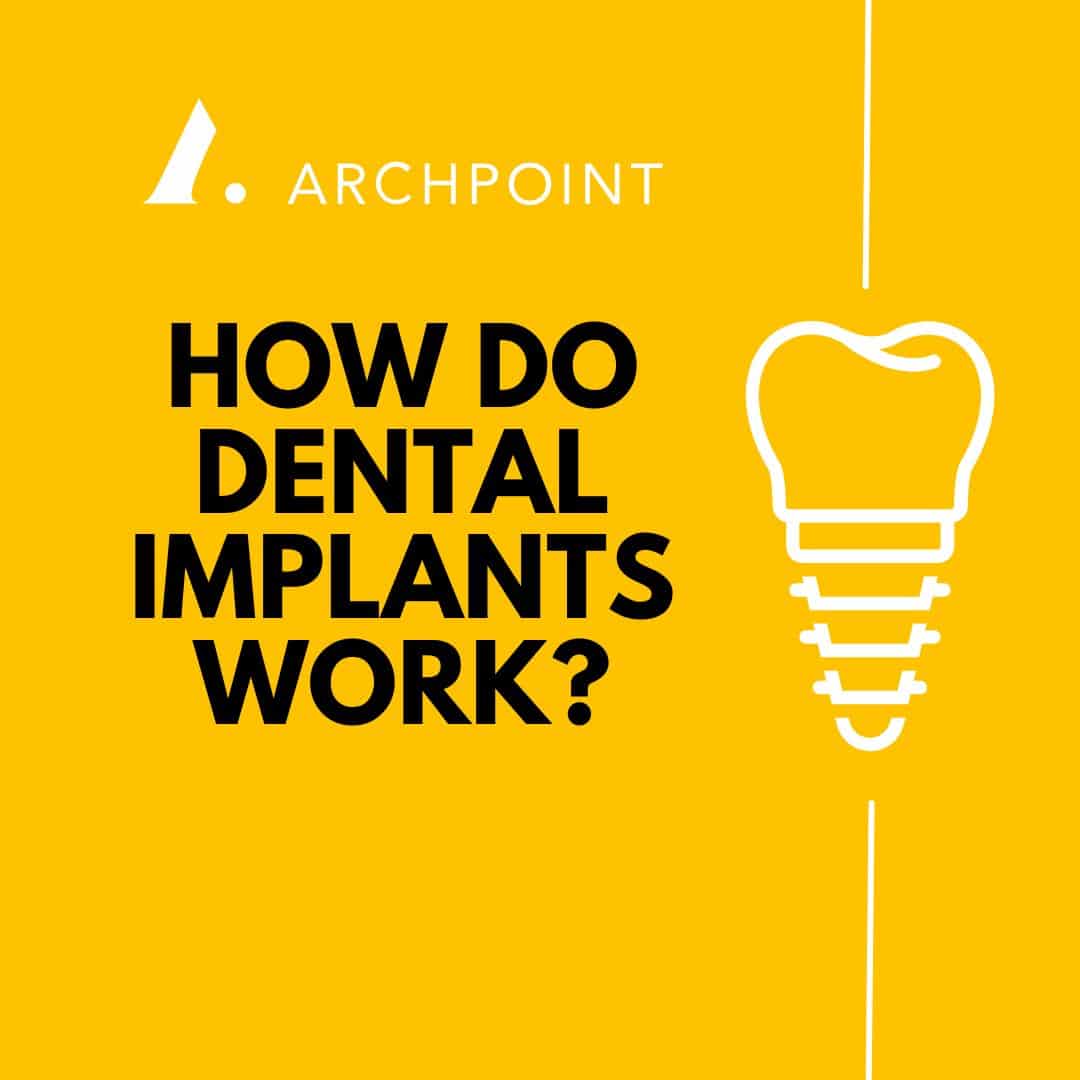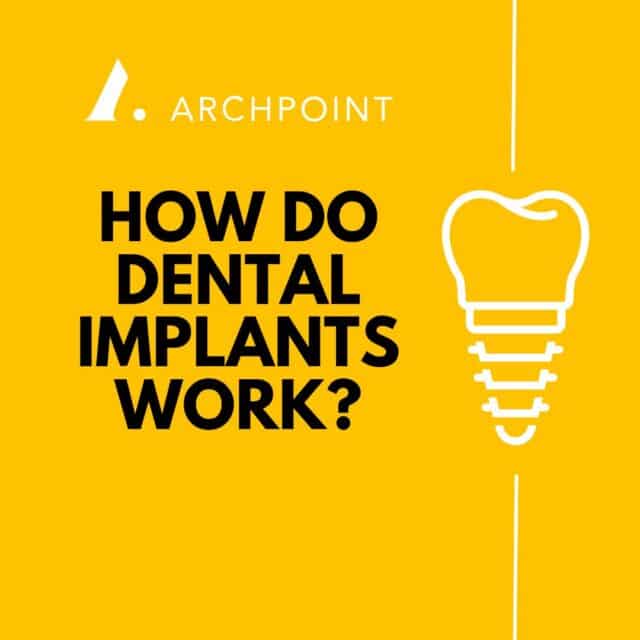
Dental implants are a cutting-edge solution for any adult with missing teeth. Their unique shape and durability are designed to provide a permanent and effective replacement for natural teeth. At ARCHPOINT Implant Dentistry in DFW, our specialists are experts in dental implant therapy and are dedicated to providing the highest quality care to our patients. This innovative tooth replacement option is totally unlike any other modern tooth replacement because implants look, feel, and function just as real teeth do.
Dental Implants Design: Made to Function Like Natural Tooth Roots
Dental implants are small titanium posts that essentially mimic the anatomy of tooth roots. Each one is surgically placed into the jawbone to replace the root of your missing tooth. They can be installed alongside other teeth and are completely non-invasive to adjacent tooth structures (unlike conventional restorations like bridges or partial dentures.)
Once your dental implant is placed, it fuses with the jawbone over the next few months through a process called “osseointegration.” This process allows the implant to become a permanent part of the bone in that area, providing a stable and long-lasting foundation for the replacement tooth.
Keep in mind that the implant itself is only the “root” portion of your new “tooth,” so it will still need a fixed restoration on top to fill in your functional smile.
Understanding the Dental Implants “Osseointegration” Process
Osseointegration is the natural process in which the bone tissues in your jaw grow onto and fuse with your dental implant. Most implants have a lightly ribbed or microtextured surface that enables bone integration, making it easy for a layer of bone to form around them. This process usually takes at least a few months to complete, but once it’s finished, your new implant will offer a strong foundation for the replacement tooth. During the integration process, it’s important to practice good oral hygiene and follow any post-operative instructions from our dental specialists. Rest assured; we can also plan ahead so that you don’t have any visibly missing teeth while your implant is integrating.
Implant Abutments: What Are They?
Once a dental implant has fully integrated with the jawbone, an abutment is placed on top of the implant to extend above the gum tissues. The abutment is a small connector that attaches the restoration or replacement “tooth” to the implant that’s set inside of the bone. Without an abutment, the new restoration wouldn’t be able to attach to the implant.
Uncovering your implant is a simple, comfortable process. We’ll gently numb the gums in that space, make an extremely small incision, then screw the abutment into the top opening of the implant. From there, the gums once again heal around the abutment, similar to the margin you’d see around a natural tooth.
Single vs. Pairs of or Multiple Dental Implants
The number of implants you’ll need depends on how many teeth are missing and where they’re located in your mouth. Single implants are an excellent choice for our patients who are missing one tooth here and there. For our patients who are missing multiple teeth, pairs or multiple implants can work together to support a bridge or denture. This approach uses fewer implants while also restoring a wider portion of your smile. In some cases, as few as four implants are needed for a full-arch prosthesis like “All-on-4”.
Choosing the Best Implant Restoration (How Many Teeth are Missing)
Choosing the right implant restoration depends on how many teeth are missing and where they’re located in the mouth. There are several options available, including crowns, bridges, clip-on dentures, and “all-on” prosthetics that restore your entire smile. Crowns are a good choice if you’re missing one tooth, while bridges work best when you have missing multiple teeth in a row (as they can be installed on top of a pair of implants working together.) But even if you’re missing all of your teeth, our DFW implant specialists can help you decide between an All-on-4 appliance or something more conventional, like a snap-on overdenture. Each one works differently from the others, so it’s important to understand exactly what you need before setting your heart on a particular type of implant treatment.
Long Term Maintenance
Just like your natural teeth, dental implants require regular maintenance and home care. We recommend that you continue to brush and floss regularly and schedule regular check-ups and cleanings to have your implants evaluated by a professional. While implants are designed to be a permanent solution for missing teeth, they can still be susceptible to plaque and tartar buildup, which may compromise the gum and bone that helps hold them in place. Regular dental check-ups can help detect any potential issues early on before major complications like peri-implantitis ever have a chance to develop.
Improving Your Diet and Quality of Life
Dental implants improve your day-to-day life because they allow you to eat whatever you want and speak more normally. Unlike dentures or partials, dental implants are designed to function like natural teeth, allowing you to eat your favorite foods without worrying about slipping or shifting, or cutting your meals up into little bites. Additionally, dental implants can improve your self-confidence by giving you a beautiful and natural-looking smile that supports the soft tissues of your lips and cheeks.
A Holistic Choice for Tooth Replacement
Dental implants are a natural choice for tooth replacement because they’re designed to function and look like real teeth. Unlike other popular tooth replacement options, dental implants don’t require adjacent teeth to be cut down, and they don’t put pressure on the bone that causes discomfort or predisposes you to infection. In reality, the opposite is true; dental implants can help preserve the jawbone by stimulating bone growth and preventing further bone loss.
Reserve a Consultation Today
ARCHPOINT Implant Dentistry offers free initial consultations—including a 3D scan—for anyone considering dental implants in Dallas or Ft. Worth. Contact us today to discuss your options and learn more about what’s possible with this modern tooth replacement solution.








